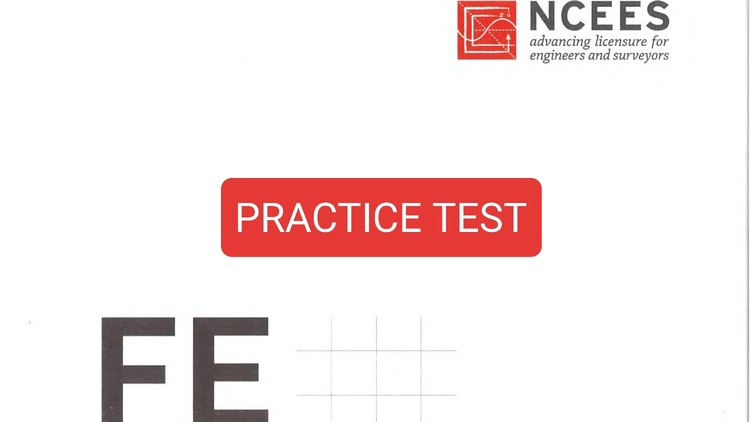Fundamentals Of Engineering (FE) Practice Exams (July 2020+)
General Engineering(Mathematics, Ethics, Probability and statistics, Eng. Econs. etc.) +EE/CE and Mechanical sections
3.54 (13 reviews)

221
students
146 questions
content
Oct 2023
last update
$29.99
regular price
What you will learn
Fundamentals Of Engineering Exam Preparation categories of the questions are general to all Engineers the other EE/CE and ME sections are being added the NCEES resources
FE Practice tests, continuously updated
Using reference prep texts as well as going over key concepts especially EE, A good refresher/Knowledge assesment
Mathematics 11–17 A. Algebra and trigonometry B. Complex numbers C. Discrete mathematics D. Analytic geometry E. Calculus F. Differential equations G. Linear algebra H. Vector analysis 2. Probability and Statistics 4–6 A. Measures of central tendencies and dispersions (e.g., mean, mode, standard deviation) B. Probability distributions (e.g., discrete, continuous, normal, binomial) C. Expected value (weighted average) in decision making D. Estimation for a single mean (e.g., point, confidence intervals, conditional probability) 4–6 A. Chemical (e.g., corrosion, ions, diffusion) B. Electrical (e.g., conductivity, resistivity, permittivity, magnetic permeability) C. Mechanical (e.g., piezoelectric, strength) D. Thermal (e.g., conductivity, expansion) 2 6. Engineering Sciences 6–9 A. Work, energy, power, heat B. Charge, energy, current, voltage, power C. Forces (e.g., between charges, on conductors) D. Work done in moving a charge in an electric field (relationship between voltage and work) E. Capacitance F. Inductance 7. Circuit Analysis (DC and AC Steady State) 10–15 A. KCL, KVL B. Series/parallel equivalent circuits C. Thevenin and Norton theorems D. Node and loop analysis E. Waveform analysis (e.g., RMS, average, frequency, phase, wavelength) F. Phasors G. Impedance 8. Linear Systems 5–8 A. Frequency/transient response B. Resonance C. Laplace transforms D. Transfer functions E. 2-port theory 9. Signal Processing 5–8 A. Convolution (continuous and discrete) B. Difference equations C. Z-transforms D. Sampling (e.g., aliasing, Nyquist theorem) E. Analog filters F. Digital filters 10. Electronics 7–11 A. Solid-state fundamentals (e.g., tunneling, diffusion/drift current, energy bands, doping bands, p-n theory) B. Discrete devices (diodes, transistors, BJT, CMOS) and models and their performance C. Bias circuits D. Amplifiers (e.g., single-stage/common emitter, differential) E. Operational amplifiers (ideal, non-ideal) F. Instrumentation (e.g., measurements, data acquisition, transducers) G. Power electronics 11. Power 8–12 A. Single phase and three phase B. Transmission and distribution C. Voltage regulation D. Transformers E. Motors and generators F. Power factor (pf) 3 12. Electromagnetics 5–8 A. Maxwell equations B. Electrostatics/magnetostatics (e.g., measurement of spatial relationships, vector analysis) C. Wave propagation D. Transmission lines (high frequency) E. Electromagnetic compatibility 13. Control Systems 6–9 A. Block diagrams (feed-forward, feedback) B. Bode plots C. Closed-loop and open-loop response D. Controller performance (gain, PID), steady-state errors E. Root locus F. Stability G. State variables 14. Communications 5–8 A. Basic modulation/demodulation concepts (e.g., AM, FM, PCM) B. Fourier transforms/Fourier series C. Multiplexing (e.g., time division, frequency division) D. Digital communications 15. Computer Networks 3–5 A. Routing and switching B. Network topologies/frameworks/models C. Local area networks 16. Digital Systems 7–11 A. Number systems B. Boolean logic C. Logic gates and circuits D. Logic minimization (e.g., SOP, POS, Karnaugh maps) E. Flip-flops and counters F. Programmable logic devices and gate arrays G. State machine design H. Data path/controller design I. Timing (diagrams, asynchronous inputs, races, hazards) 17. Computer Systems 4–6 A. Architecture (e.g., pipelining, cache memory) B. Microprocessors C. Memory technology and systems D. Interfacing 18. Software Development 4–6 A. Algorithms B. Data structures C. Software design methods (structured, object-oriented) D. Software implementation (e.g., procedural, scripting languages) E. Software testing
3. Ethics and Professional Practice 3–5 A. Codes of ethics (professional and technical societies) B. NCEES Model Law and Model Rules C. Intellectual property (e.g., copyright, trade secrets, patents) 4. Engineering Economics 3–5 A. Time value of money (e.g., present value, future value, annuities) B. Cost estimation C. Risk identification D. Analysis (e.g., cost-benefit, trade-off, breakeven) 5. Properties of Electrical Materials
Screenshots




3233455
udemy ID
6/13/2020
course created date
8/21/2020
course indexed date
ahmed.mustafa.1982@gmail.com
course submited by